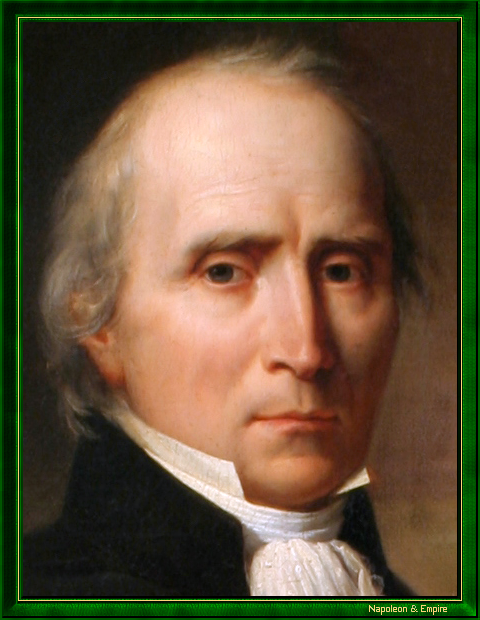François de Barbé-Marbois
Count of the French Empire
Pronunciation:

François de Barbé-Marbois, born in Metz (Three Bishoprics, eastern France) on January 31, 1745, was a diplomat under the Ancien Régime who served in Germany and then in the United States during the American Revolutionary War. In 1785, he was named intendant of the colony of Saint-Domingue.
He returned to France at the beginning of the Revolution and to the diplomatic service. During the Reign of Terror he sought refuge in Metz where he managed to escape investigation.
In 1795, he was elected to the Council of the Ancients by his native city after serving as mayor for a short period of time. His reputation as a royalist preceded him and was confirmed when compromising documents where discovered as he crossed the border back into France. During the struggle between the Directoire and the royalist factions in the legislatures, his consistent anti-government stance had him placed on the list of exiles after the coup d'état of 18 Fructidor, Year 5 (September 4, 1797 in the French Republican Calendar). He was deported to Cayenne in Guyana.
After the coup d'état on 18 Brumaire (November 9, 1799), Barbé-Marbois was brought back to France by his close friend Charles-François Lebrun who also secured him nomination to the Cabinet (conseil d'État) from Napoleon Bonaparte. In February 1801, he was promoted from Counselor to Director of the Treasury and to Minister in September thanks to his administrative experience, his integrity and his widespread support.
In this role, he championed the creation of the Germinal Franc and the sale of Louisiana to the United States (Louisiana Purchase) in May.
The brutal financial crisis that shook the country at the dawn of the Empire cost him his job when the limits of his financial and political talents became apparent. Ironically, he suggestion was to combat the public's panic by calling on the military to intervene. Napoleon harshly dismissed him in January 1806.
However, this did not prevent him from being named First President of the Court of Audit (Cour des comptes) upon its creation on September 16, 1807. The unfailing honour he paid to the Emperor during the following years earned him a seat in the Senate and the title of Count.
This did not prevent him from quickly abandoning the imperial cause when the political skies darkened. A member of the Senate committee that prepared Napoleon's act of abdication and the creation of a provisional government, he later advised the Court of Audit to endorse the return of the Bourbons. He was among the first to welcome Louis XVIII to the throne.
He was rewarded with two nominations: one to the Chamber of Peers and the other to the commission charged with writing a new constitution.
Expelled from Paris by Napoleon during the Hundred Days, he returned as President of the Court of Audit after the Second Restoration, a position he retained until 1834. From September 1815 to May 1816, he briefly served as Minister of Justice before serving in the Chamber of Peers until his death.
He died on January 12, 1837 (January 14 according to some sources) in a hotel in Paris and was buried in the Cemetery of Noyers (Eure), a small village where he owned a castle .
"Count François de Barbé-Marbois", by Jean-Pierre Franque (Buis-les-Baronnies 1774 - Quintigny 1860).

The following exchange during a meeting in January 1806 between the two men gives an idea of the violence with which Napoleon could bear toward a supporter who had disappointed him: I dare to hope Your Majesty does not accuse me of being a thief.
Napoleon replied, I would prefer it a hundred times over. At least knavery has limits, idiocy does not.
Napoleon continued to hold a grudge against Barbé-Marbois for his attitude in April 1814: I find it outrageous that a man who had served so loyally would testify so eagerly to his ingratitude when it was not required by necessity.
In 1953, the United States Postal Service released a three-cent stamp commemorating the 150th anniversary of the Louisiana Purchase showing François de Barbé-Marbois along side the American negotiators James Munroe and Robert Livingston.